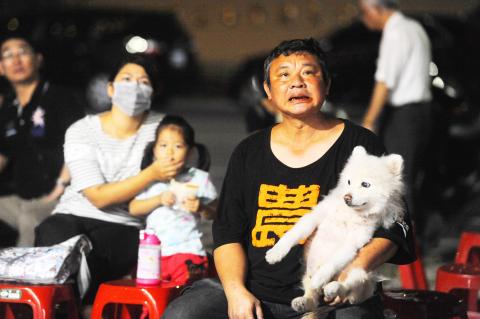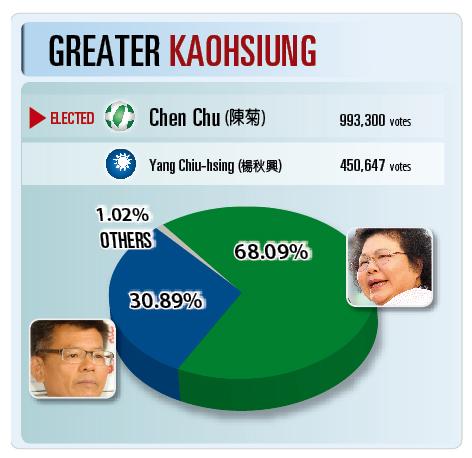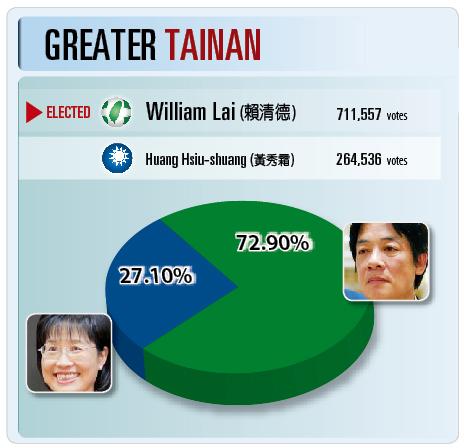Greater Kaohsiung and Greater Tainan yesterday saw their political “status quo” maintained after incumbent Kaohsiung Mayor Chen Chu (陳菊) and Tainan Mayor William Lai (賴清德), both members of the Democratic Progressive Party (DPP), succeeding in being elected for a second term in office.
Chen received 993,300 votes, or 68.09 percent of the votes cast, while Chinese Nationalist Party (KMT) mayoral candidate Yang Chiu-hsing (楊秋興) received 450,647 votes, for 30.89 percent of the total.
Independent mayoral candidate Chou Ke-sheng (周可盛) received 14,925 votes, or 1.02 percent of the total.

Photo: Chang Chung-yi, Taipei Times
Chen’s votes had increased from 821,089 votes, or 52.79 percent of the total in 2010.
Chen said she would continue her policies of helping Greater Kaohsiung’s transition to a more habitable city, maintaining district equality, increasing social welfare and helping industry become more innovative.
Chen also expressed gratitude to supporters for voting for her and being steadfast supporters of the DPP, and extended thanks to all of her campaign personnel as well, as she had been busy overseeing the rebuilding the city after the gas pipeline explosions in early August.

Graphic: TT
Meanwhile, Yang acknowledged that he lost the election and said it was “a severe setback,” but said that he wished to thank the people of Greater Kaohsiung who had supported him.
In Greater Tainan, although the mayoral candidates’ nominations of both parties had all but settled the question of who would win the election, the focus on the mayoral elections was instead on the number of votes that Lai would receive.
Though Lai’s popularity in the city was expected, pundits said that the more votes Lai received, the more it would help his future career.

Graphic: TT
Greater Tainan election results concluded with Lai receiving 711,557 votes, or 72.9 percent of the votes, while the KMT’s Huang Hsiu-shuang (黃秀霜) received 264,536 votes, or 27.1 percent of the total.
Compared with the results from the previous election in 2010, Lai’s votes have increased by 91,660 from 2010’s 619,897, and his support rate has increased by 12.49 percentage points from 60.41 percent.

Taiwan is stepping up plans to create self-sufficient supply chains for combat drones and increase foreign orders from the US to counter China’s numerical superiority, a defense official said on Saturday. Commenting on condition of anonymity, the official said the nation’s armed forces are in agreement with US Admiral Samuel Paparo’s assessment that Taiwan’s military must be prepared to turn the nation’s waters into a “hellscape” for the Chinese People’s Liberation Army (PLA). Paparo, the commander of the US Indo-Pacific Command, reiterated the concept during a Congressional hearing in Washington on Wednesday. He first coined the term in a security conference last

Prosecutors today declined to say who was questioned regarding alleged forgery on petitions to recall Democratic Progressive Party (DPP) legislators, after Chinese-language media earlier reported that members of the Chinese Nationalist Party (KMT) Youth League were brought in for questioning. The Ministry of Justice Investigation Bureau confirmed that two people had been questioned, but did not disclose any further information about the ongoing investigation. KMT Youth League members Lee Hsiao-liang (李孝亮) and Liu Szu-yin (劉思吟) — who are leading the effort to recall DPP caucus chief executive Rosalia Wu (吳思瑤) and Legislator Wu Pei-yi (吳沛憶) — both posted on Facebook saying: “I

Sung Chien-liang (宋建樑), who led efforts to recall Democratic Progressive Party (DPP) Legislator Lee Kun-cheng (李坤城), was released on bail of NT$80,000 today amid outcry over his decision to wear a Nazi armband to questioning the night before. Sung arrived at the New Taipei District Prosecutors’ Office for questioning in a recall petition forgery case last night wearing a red armband bearing a swastika, carrying a copy of Adolf Hitler’s Mein Kampf and giving a Nazi salute. Sung left the building at 1:15am without the armband and covering the book with his coat. Lee said today that this is a serious

A mountain blaze that broke out yesterday morning in Yangmingshan National Park was put out after five hours, following multi agency efforts involving dozens of fire trucks and helicopter water drops. The fire might have been sparked by an air quality sensor operated by the National Center for High-Performance Computing, one of the national-level laboratories under the National Applied Research Laboratories, Yangmingshan National Park Headquarters said. The Taipei City Fire Department said the fire, which broke out at about 11am yesterday near the mountainous Xiaoyoukeng (小油坑) Recreation Area was extinguished at 4:32pm. It had initially dispatched 72 personnel in four command vehicles, 16